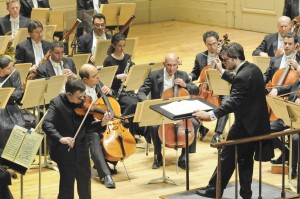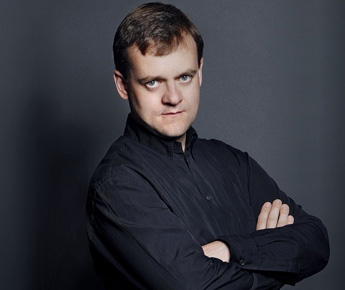Concert Review: Frank Peter Zimmermann and the Boston Symphony Orchestra/Juraj Valcuha
The concert’s other purely orchestral work, Mendelssohn’s “Scottish” Symphony (no. 3), came after intermission and offered Mr. Valcuha the opportunity to demonstrate his command of large-scale symphonic structure. Let’s just say he flexed some pretty impressive muscle.
Kodály, Dvořák and Mendelssohn. Presented by the Boston Symphony Orchestra. At Boston Symphony Hall Boston, MA, through March 24.
By Jonathan Blumhofer

Juraj Valcuha leading violinist Frank Peter Zimmermann and the Boston Symphony Orchestra. Photo: Stu Rosner
The unseasonably warm start of spring was echoed by a distinctly summery program at Symphony Hall this past Thursday evening as the Boston Symphony Orchestra (BSO) returned to its subscription season following a two-week hiatus that took the orchestra on tour to Carnegie Hall and saw a week of youth and family concerts here in Boston. The extraordinary Frank Peter Zimmermann was soloist in Dvořák’s vibrant Violin Concerto, while Juraj Valcuha made his BSO podium debut, conducting the orchestra in further pieces by Kodály and Mendelssohn.
2012 has been a pretty good year thus far for the BSO and young conductors: Jaap van Zweden, Stéphane Denève, and Giancarlo Guerrero have all led memorable performances here in the last two months. Happily, this trend continues with Mr. Valcuha, who is also Chief Conductor of the Orchestra Sinfonica Nazionale della RAI, Torino.
The evening began with Kodály’s Dances of Galánta, a thoroughly engaging recollection of the eighteenth-century, Hungarian verbunkos musical tradition. The BSO has only played this score twice before, once in 1955 with Arthur Fiedler and again in 1999 with Kazushi Ono. On Thursday, though, the orchestra launched into the piece as though they’d performed it for years, emphasizing its shifts of mood and character with sensitivity and agility. Mr. Valcuha brought a fine sense of the score’s overall shape to the performance, though there were a few moments toward the beginning where the BSO’s playing could have been a bit less stiff. No matter—by the end of the piece they were blazing, with Cynthia Meyers’s piccolo leading the way.
The concert’s other purely orchestral work, Mendelssohn’s “Scottish” Symphony (no. 3), came after intermission and offered Mr. Valcuha the opportunity to demonstrate his command of large-scale symphonic structure. Let’s just say he flexed some pretty impressive muscle, providing a guiding presence while, for the most part, doing what young conductors in his position don’t often do best: staying out of the orchestra’s way.
As a composer, Mendelssohn doesn’t tend to rank in the popular memory as a leading musical innovator, though his manipulation of form could be as daring and novel as anything Schumann, Berlioz, or Wagner did in the 1830s and ‘40s. So it is in the “Scottish” Symphony. Schumann commented on the “intimate connection” of the Symphony’s four movements, and Mendelssohn prefaced the score with a note asking that each movement be played without the customary pause in between, a device Schumann would echo in his Fourth Symphony.
Mr. Valcuha and the BSO took Mendelssohn at his word, giving a taut, dramatic reading of this luminous, melancholy score. At its heart was a soulful, expressive, slow third movement whose primary melody—one of Mendelssohn’s finest—unfolded rhapsodically. The brisk second movement Scherzo was lithe and energetic, while the outer movements were notable for their turbulent changes of mood and high musical drama. Throughout, Mr. Valcuha and the BSO emphasized Mendelssohn’s contrapuntal textures with precision and energy, never losing touch with the dance-like quality much of this music possesses.
In between these two gems came a truly exceptional performance. These concerts mark Mr. Zimmermann’s first return to Symphony Hall since 2009, and he remains as technically gifted and interpretively probing an artist as ever. With Mr. Valcuha on the podium, he has an attentive accompanist with equally deft musical sensibilities. Together, they gave a deeply felt, nuanced reading of Dvořák’s seldom-heard Violin Concerto that stands among the high points of this BSO season.
To these ears, Dvořák’s music often sounds like Brahms’s but with a smile, and I don’t mean that as a slight to either, particularly Dvořák: Dvořák was one of the great composers of his day and one of the finest tunesmiths ever. He’s that rarest of classical music phenomenons, a crowd-pleaser—but for all the right reasons.
Brahms’s Violin Concerto, in fact, inspired Dvořák’s and there are some general ways in which the younger composer paid homage to his idol’s earlier piece (the fiendish solo virtuosity, the use of hemiolas and eastern European folk musical material, etc.). Still, you’re not going to mistake Dvořák’s Concerto for Brahms’s or vice versa: Dvořák’s melodic writing is unmistakable and his use of Czech furiant and dumka rhythms singular.
All of this, plus a wealth of interpretive insight and musical purpose, came across in Thursday’s performance. Mr. Zimmermann, who performs on Fritz Kreisler’s 1711 Stradivarius, attacked the solo part’s opening arpeggios with gusto and never looked back. The Concerto’s first movement is perhaps the most diffuse of the three, alternating passages that showcase the soloists’ technique with orchestral interjections. In this performance, the flashy moments, though, were never just that: Mr. Zimmermann shaped every phrase and gesture with sensitivity and meaning—there is an inner logic to his interpretation that is as distinguishing as Dvořák’s musical voice is unique.

Violinist Frank Peter Zimmermann—he is highly energetic in performance, playing with a bright tone and impeccable intonation.
Mr. Valcuha and the BSO proved themselves sensitive accompanists throughout, following Mr. Zimmermann’s lead in his accompanied cadenzas and taking over, where appropriate, in other sections. It was all a rich demonstration of the collaborative nature of concerto performance: as in its best readings, there was a sense of music spontaneously being made together.
The slow second movement features one of Dvořák’s patented lyrical melodies in a number of strikingly delicate orchestrations with the solo violin. Again on Thursday, there was a great sense of chamber music being made, with Mr. Zimmermann often actually turning to face his orchestral partner in song. In the energetic finale, high spirits ruled the day, the mid-movement detour towards the minor mode proving the one (small) cloud on an otherwise clear horizon.
On stage, Mr. Zimmermann is a very young 47, highly energetic in performance, playing with a bright tone and impeccable intonation. There were a couple of moments on Thursday in which the BSO (particularly the winds) were tonally out of synch with him, though even these blemishes hardly take away from the collective ensemble’s accomplishments on Thursday night.
Tagged: Boston Symphony Orchestra, BSO, Frank Peter Zimmermann

I was at the show tonight. Mr. Zimmernann is extremely talented — I’ve never seen a soloist pick with the left hand while using the bow as well. If anyone has a video or audio of tonight’s concert, please let me know.
What was the name of the encore played on Saturday — simply stunning!
I would love to know the name of the encore as well. Zimmerman was so magnificent while being charming and engaging.
After a little research (not calling Symphony Hall), I’m fairly certain that the encore was Paganini’s variations on the second movement of Haydn’s quartet op 76 no 3 “Kaiser.”
It seems that Paganini never wrote such a piece. Same for Wieniawski, who is quoted on You Tube for that kind of piece. After a recent performance of Zimmermann, the radio speaker told that the author is the same violinist, who probably wrote a piece in the perfect style of Paganini (it remembers the structure of the Var. on God save the King)
Hmmm, no, they both wrote works based on Haydn’s melody. Paganini’s variations are for violin and orchestra, so they’re the more likely candidate.
Hi Rob,
I’m not aware of any audio or video from this week’s performances aside from the WGBH broadcast that can be streamed on demand for a time (http://www.wgbh.org/programs/The-Boston-Symphony-Orchestra-in-Concert-1641/episodes/Frank-Peter-Zimmermann-Plays-Dvorak-35599).
Several years ago I heard Zimmermann give a riveting performance of the Brahms Violin Concerto with the BSO and he followed it up with – if memory serves – this encore (http://www.youtube.com/watch?v=YGmIlMS60c0). Not only is he, interpretively, as good as they come, but he’s also got technique to burn.
Enjoy!
JB
Hi JB,
The link you provided either wasn’t for this past Saturday’s broadcast as there was no encore or the encore was cut from the recording — if it was it’s a shame.
Thenks,
Richard
Hi Richard,
Sorry about that: the listing on the link says the broadcast was from the 24th, so, if that’s right, they must have cut the encore. Zimmermann didn’t give an encore on Thursday night – much as my concert-going companion and I tried to encourage him! – and I would love to have heard what he played on Saturday. A pity, indeed!
JB